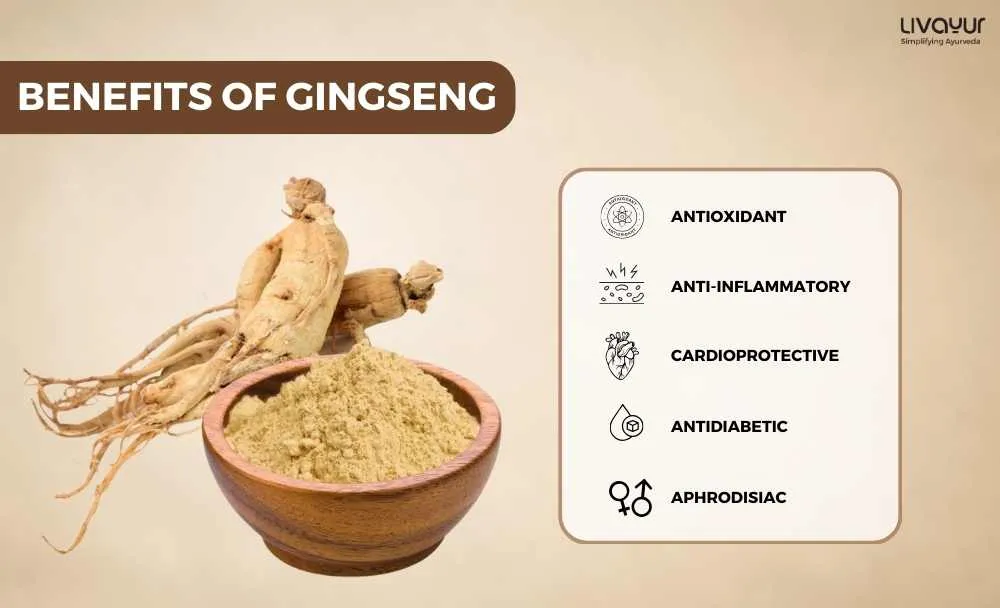
Ginseng, often hailed as the king of all herbs, holds a treasured place in traditional Asian medicine for its remarkable health benefits. This ancient herb, rich in active ingredients like steroidal saponins, protopanaxadiol, and protopanaxatriol, collectively known as ginsenosides, has been valued for its therapeutic properties for thousands of years [1].
Saponins and ginsenosides are the signature compounds of the genus Panax, which is commonly referred to as ginseng, especially in the case of Asian or Chinese ginseng (Panax ginseng). This genus, belonging to the family Araliaceae, predominantly thrives in the northern hemisphere and is cultivated in numerous countries worldwide. One such renowned variety is Indian ginseng, popularly known as Ashwagandha. [1]
Let’s dig deeper into the many benefits and uses of ginseng in this article, and incorporate this incredible herb into our lives.
Ingredients used in Ginseng
Here are some key ingredients found in Ginseng.
1. Ginsenosides
These are the primary active compounds in Ginseng and are responsible for its adaptogenic properties. Ginsenosides have the potential to enhance immune function and reduce inflammation. [2]
2. Polysaccharides
These compounds contribute to the plant’s immune-modulating effects and may have antioxidant properties. [2]
3. Peptides
Ginseng roots also contain peptides, which are short chains of amino acids. Some peptides found in Ginseng may exhibit anti-fatigue effects and help improve physical endurance. [2]
4. Saponins
Besides ginsenosides, Ginseng contains other saponins that contribute to its pharmacological effects. Saponins can support the immune system and may have adaptogenic properties. [2]
The Many Benefits of Ginseng
1. Antioxidant Activity[1]
Primary Benefits: Ginseng’s potent antioxidant activity makes it a valuable contender in the battle against harmful free radicals and oxidative stress. Research has shown that ginseng extracts possess the ability to scavenge free radicals effectively, protecting conditions like atherosclerosis, asthma, cancer, and more.
Secondary Benefits: Additionally, ginseng has been found to increase the levels of antioxidant enzymes, such as glutathione peroxidase and superoxide dismutase, further reinforcing its antioxidative prowess.
2. Anti-inflammatory Activity[1]
Primary Benefits: Inflammation is a natural response to infection, but excessive or chronic inflammation can lead to various health issues. Ginseng has demonstrated anti-inflammatory potential through the suppression of key signaling pathways like NF-kB and inhibition of inflammatory cytokines.
Secondary Benefits: Studies have reported that ginseng can inhibit the production of pro-inflammatory cytokines, offering promising therapeutic prospects for inflammatory conditions.
3. Antimicrobial Activity[1]
Primary Benefits: Amidst the global rise in antibiotic resistance, ginseng’s antimicrobial properties have piqued interest in the scientific community. Ginseng extracts and components have shown antiviral activity against various strains, including respiratory syncytial virus, H5N1 influenza virus, and HIV type-1.
Secondary Benefits: Furthermore, ginseng has demonstrated antibacterial effects against pathogens like Staphylococcus aureus and methicillin-resistant bacteria.
4. Cardioprotective Activity[1]
Primary Benefits: Cardiovascular disease remains a leading cause of mortality worldwide. Ginseng’s active compounds have been found to stimulate nitric oxide production, inhibit ROS production, and improve blood circulation, supporting heart health.
Secondary Benefits: Ginsenosides have also shown the ability to inhibit calcium ion entry, enhancing cardiac function and offering potential benefits in cardiovascular disorders.
5. Antiobesity Effect[1]
Primary Benefits: In the battle against obesity and its associated health risks, ginseng emerges as a potential natural ally. Research has suggested that ginsenosides can increase energy expenditure and reduce energy intake, contributing to their anti-obesogenic effect.
Secondary Benefits: Clinical studies have also reported positive outcomes, such as reduced cholesterol and triglyceride levels, after ginseng supplementation.
6. Antidiabetic Effect[1]
Primary Benefits: Ginseng has shown promising effects in improving insulin secretion and glucose regulation in both in vitro and in vivo studies.
Secondary Benefits: As such, ginseng can be effectively used to manage diabetes.
7. Neuroprotective Effect[1]
Primary Benefits: The components of ginseng, especially certain ginsenosides, have shown significant therapeutic effects in various neurological disorders, including memory, anxiety, depression, and neurodegenerative diseases. Research has suggested that ginseng may protect against depression by upregulating specific receptors.
Secondary Benefits: Moreover, ginseng has shown neuroprotective effects against conditions like Alzheimer’s and Parkinson’s diseases.
8. Aphrodisiac Effect[1]
Primary Benefits: Ginseng has gained popularity as a herbal supplement for its reputed ability to enhance energy, strength, and sexual endurance. Research has shown that ginsenosides, the active compounds in ginseng, have potent antifatigue effects by reducing oxidative stress and improving energy metabolism.
Secondary Benefits: Moreover, ginseng can also help with erectile dysfunction. Clinical studies on men with moderate to severe erectile dysfunction showed significant improvements in erectile performance and sexual satisfaction scores after consuming Korean ginseng for 8 weeks.
9. Anticancer Activity[1]
Primary Benefits: Cancer remains a major global health concern, and ginseng has emerged as a potential complementary treatment for cancer patients. Ginsenosides, the active compounds in ginseng, have demonstrated potent anticancer properties.
Secondary Benefits: Research also shows that ginsenoside Rb1 inhibited the viability and invasiveness of lung cancer cells by targeting specific cellular proteins. Ginsenoside Rd downregulated the expression of inflammatory and proliferative markers in liver cancer cells.
Therapeutic Uses of Ginseng[1]
Rich in antioxidants, ginseng helps combat various diseases and disorders, such as atherosclerosis, asthma, and cancer.
It also helps prevent microbial infections caused by viruses like respiratory syncytial virus and H5N1 influenza virus, as well as bacteria such as Staphylococcus aureus and methicillin-resistant strains.
Furthermore, the neuroprotective activity of ginseng helps prevent numerous neurodegenerative diseases, including Alzheimer’s and Parkinson’s.
Other uses of ginseng include managing diabetes, treating erectile dysfunction, and preventing and fighting cancer.
Dosage
The appropriate dosage of ginseng depends highly on your medical condition, purpose, and many other factors. Therefore, you must consult a practitioner to know more about the dosage before consuming it.
Safety & Side Effects[1]
Ginseng is generally considered safe for consumption. However, caution is necessary due to potential adverse effects reported in some case studies.
Some studies have shown toxic or harmful effects for both genders and all age groups when ginseng is abused or misused. These effects include maniac episodes, uterine bleeding, gynecomastia, long QT syndrome, atrial fibrillation with bradycardia, hypertensive crisis, and acute lobular hepatitis.
It is worth noting that ethanol-extracted ginseng can cause cerebral arteritis and may even trigger Stevens-Johnson syndrome. Recently, a study highlighted inflammatory papules in a 60-year-old woman as an adverse cutaneous effect of ginseng consumption. Additionally, standardized P. ginseng extract, depending on dosage and duration of use, can affect cardiac function, leading to heart failure, decreased blood pressure, and diastolic dysfunction.
Interactions of Ginseng with other drugs
While generally considered safe, Ginseng can potentially interact with certain medications to alter their effects.
1. Warfarin
Ginseng’s potential antiplatelet effects may interfere with the blood-thinning properties of warfarin. It can cause unpredictable changes in blood clotting. [3]
2. Insulin and antidiabetic medications
Ginseng can lower blood sugar levels. When combined with insulin or other antidiabetic medications, it may cause hypoglycemia (low blood sugar). [4]
3. Immunosuppressant drugs
Ginseng’s immune-stimulating effects may interfere with immunosuppressant medications, reducing their effectiveness. [4]
4. Antihypertensive medications
Ginseng may affect blood pressure levels. When taken in combination with antihypertensive medications, it could lead to low blood pressure. [5]
List of diseases for which Ginseng is used
Here are some disorders where Ginseng can help manage the condition.
1. Cancer
Ginseng has potential anti-cancer properties. Studies suggest that ginsenosides, the active compounds in Ginseng, may inhibit the growth and development of cancer cells. [8]
2. Diabetes
Studies indicate that ginsenosides may improve insulin sensitivity and lower blood sugar levels. [8]
3. Cardiovascular diseases
Studies suggest that ginsenosides may have vasodilatory effects. It means they can help relax blood vessels and improve blood flow. Additionally, Ginseng may positively impact cholesterol levels, making it a potential ally in supporting heart health and managing cardiovascular diseases. [8]
4. Central nervous system (CNS) function
Ginseng has enhanced effects on the central nervous system, including cognitive function and mood. Research suggests ginsenosides have neuroprotective properties and could play a role in improving cognitive performance. [8]
5. Relieving stress
Ginseng is an adaptogen, which may help the body adapt to stress and maintain balance. It can modulate the body’s stress response and reduce the impact of stress on physiological systems. [8]
The Takeaway
Ginseng boasts a wide array of health benefits. From its potent antioxidant and anti-inflammatory properties to antimicrobial, neuroprotective, and cardioprotective effects, ginseng proves to be a versatile herbal ally.
It shows promise in managing diabetes, aiding weight loss, and even serving as an aphrodisiac.
However, caution is essential due to potential side effects, and consulting a healthcare practitioner is advised for appropriate dosage and usage.
FAQs
1. Can ginseng be used to manage diabetes?
Yes, ginseng has shown promising effects in improving insulin secretion and glucose regulation, making it effective for managing diabetes.
2. Can ginseng aid in weight loss?
Yes, research suggests that ginsenosides in ginseng can increase energy expenditure and reduce energy intake, contributing to its anti-obesity effect.
3. Can ginseng be taken during pregnancy?
Pregnant women should exercise caution, as ginseng consumption during the first trimester and lactation may have toxic effects. Consult a healthcare practitioner before use.
Disclaimer:
The information provided here is for general information and not meant to substitute any medical advice. Please consult your doctor for appropriate medical consultation.
References
- https://www.sciencedirect.com/science/article/pii/S1226845320300592
- Ginseng Compounds: An Update on Their Molecular Mechanisms and Medical Applications
- Antiplatelet role of Korean GinsengGinseng and ginsenosides in cardiovascular diseases
- Ginseng on Hyperglycemia: Effects and Mechanisms
- Cardiovascular Diseases and Panax ginseng: A Review on Molecular Mechanisms and Medical Applications
- Chapter 8 Biological Activities of Ginseng and Its Application to Human Health

















